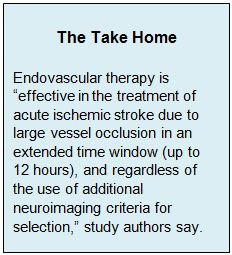Key Points:
- Meta-analysis of 5 trials finds better functional outcomes with endovascular vs standard therapy for acute stroke
- No increased complications, with trend toward improved 90-day survival
Endovascular therapy using retrievable stents provides better outcomes than standard therapy for the treatment of acute stroke, according to a meta-analysis presented on October 13, 2015, at the annual Transcatheter Cardiovascular Therapeutics (TCT) meeting.
The findings also were published online October 14 ahead of print in JACC: Cardiovascular Interventions.
Researchers led by Konstantinos Marmagkiolis, MD, of Citizens Memorial Hospital and the University of Missouri (Columbia, MO), identified 5 randomized controlled trials—MR CLEAN, ESCAPE, EXTEND-IA, SWIFT-PRIME, and REVASCAT—comparing endovascular therapy using retrievable stents (n = 634) with standard therapy (n = 653) for the management of acute stroke. All were published between May 2005 and May 2015.
Patients randomized to endovascular therapy were more likely than those assigned to standard treatment to have a modified Rankin Scale (mRS) score of 0-2 at 90 days (OR 2.43; 95% CI 1.9-3.09). Intracranial bleeding and 90-day mortality were similar for both groups of patients (table 1).
Table 1. Outcomes of Acute Stroke Patients
|
|
Endovascular Therapy (n = 634) |
Standard Therapy (n = 653) |
P Value |
|
90-Day mRS Score 0-2 |
42.6% |
26.1% |
< 0.0001 |
|
Intracranial Bleeding |
4.2% |
4.3% |
0.78 |
|
90-Day Mortality |
15.1% |
18.7% |
0.19 |
There was no evidence of significant heterogeneity or publication bias for any of the endpoints, researchers said.
‘Breakthrough’ Treatment
“This meta-analysis confirms that endovascular treatment is effective in the treatment of acute ischemic stroke due to large vessel occlusion in an extended time window (up to 12 hours), and regardless of the use of additional neuroimaging criteria for selection, especially at earlier time points (up to 6 hours),” Dr. Marmagkiolis and colleagues write.
“This is an important breakthrough in stroke treatment, in fact the most important breakthrough since the National Institute of Neurological Disorders and Stroke (NINDS) t-PA trial that established the use of IV thrombolysis for ischemic stroke 20 years ago,” they stress.
According to the researchers, the positive findings for endovascular stroke therapy are likely to “result in major changes in healthcare systems and accelerate the development of centers of excellence, such as comprehensive stroke centers, that will be preferentially able to accept and treat patients with the most severe ischemic strokes.
“Several current or planned studies (such as the DAWN, PISTE, THERAPY, THRACE, THRILL studies) may provide high-level evidence for the efficacy of endovascular treatment in different patient populations and subgroups,” they note, adding that “refinement of retrieving devices and selection criteria … may allow the time window to be extended even further, up to 15 hours in the anticipated DEFUSE-3 trial, or even up to 24 hours in the DAWN trial.”
Source:
Marmagkiolis K, Hakeem A, Cilingiroglu M et al. Safety and efficacy of stent retriever for the management of acute ischemic stroke: Comprehensive review and meta-analysis. JACC Cardiovasc Interv. 2015;Epub ahead of print.
Disclosures:
- Drs. Marmagkiolis and Maldonado report no relevant conflicts of interest.


